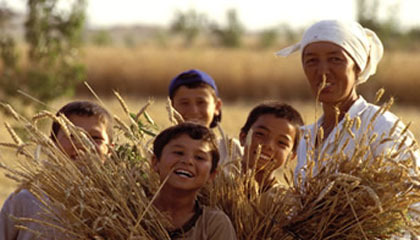The world financial crisishas dimmed short-term prospects for the whole world and recession in developed countries and sharp slowdown in developing countries inevitable, according to a report released by the World Bank on Tuesday.

The volume of world trade is likely to contract for the first time since 1982 due to the crisis, while the sharp slowdown has caused commodity prices to plummet, ending a historic five-year boom, said the Global Economic Prospects (GEP) 2009.
Developing world to face two major external shocks
The report finds the global economy transitioning from a long period of strong developing-country led growth to one of great uncertainty as the financial crisis in developed countries has shaken markets worldwide.
It projects that world GDP growth will be 2.5 percent in 2008 and 0.9 percent for 2009. Developing countries will likely grow by 4.5 percent next year, down from 7.9 percent in 2007, while growth in high-income countries will turn negative.
"People in the developing world have had to deal with two major external shocks -- the upward spiral in food and fuel prices followed by the financial crisis, which has eased tensions in commodity markets but is testing banking systems and threatening job losses around the world," said Justin Lin, World Bank chief economist and senior vice president.
"Urgent steps are needed to help reduce fallout from the crisis on the real economy and on the poorest, including through projects that build better roads, railways, schools, and health care systems," he said.
In light of the crisis, the World Bank is increasing its support for developing countries, including through new IBRD commitments of up to 100 billion dollars over the next three years as well as via its private sector arm, the IFC, in the form of facilities for trade finance, banking recapitalization, and for privately-funded infrastructure projects facing financial distress.
With world trade volumes projected to contract 2.1 percent in 2009, developing countries will see a big drop in their exports. Tighter credit conditions and increased uncertainty are expected to see investment growth in both developing and high-income countries slow in 2009 -- actually falling 1.3 percent in developed countries and rising by only 3.5 percent in developing countries versus 13 percent in 2007.
"The immediate threat to recovery is further failure of major financial institutions," warned Hans Timmer, Lead Economist and Manager in the World Bank's Global Trends unit.
"Policymakers in developing countries should monitor their banking sectors carefully and be prepared to enlist external support to shore up currencies and banking systems." said Uri Dadush, Director of the World Bank's Development Prospects Group.
"Given the expected decline in global trade, both developed and developing countries need to resist the temptation to resort to protectionism, which would only prolong and deepen the crisis," he noted.
Oil prices expected to average 75 dollars a barrel next year
The collapse in global growth has reversed the surge in commodity prices that characterized the first half of the year, with prices of virtually all commodities falling sharply since July, said the report.
While real food and fuel prices in developing countries have dropped considerably, they remain high relative to the 1990s and the social turmoil and human crises they triggered are still reverberating.
Overall, higher food and fuel prices have cost consumers in developing countries about 680 billion dollars in extra spending in 2008 and pushed an additional 130-155 million people into poverty.
According to the GEP, next year oil prices are expected to average about 75 dollars a barrel and food prices worldwide are expected to decline by 23 percent compared with their average in 2008.